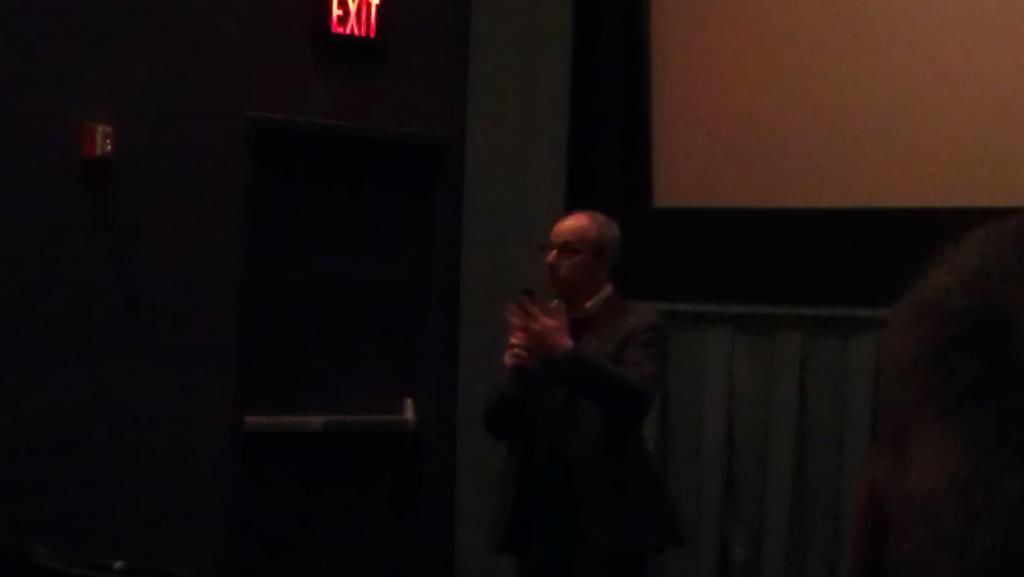
Filmmaker Neil Barksy doing Q&A.
Not a bad Q&A, in that it had a filmmaker who was happy to answer questions about making the film and his subject. As sometimes happens with documentaries that are kind of high-level examinations of a subject, there will often be questions about something relatively specific, and when the filmmaker answers them, it's not hard to ask why that bit wasn't in the final film. Barksy had a great line about how Ed Koch has written fifteen books - eight of them autobiographies - that sort of has to make it in there.
Barksy also was able to talk at a bit of length on what he felt about Koch's personality and motivations were, sometimes seeming to hash it out while talking - for instance, he thinks Koch was gay, probably couldn't have been elected mayor in 1977 if he were out, but might have found a good reception if he came out later, perhaps during the AIDS crisis. I wonder, though - considering that a scandal throughout his office but seemingly not actually involving him made re-election impossible, he might have felt his reputation couldn't stand having that lie confirmed, no matter how sympathetic i might have made him.
He also said that Koch was in many ways a dream subject, in that he quite enjoyed being on camera, had entertaining things to say, and didn't expect to exercise much influence over the film in exchange for extensive access, which isn't always a given. Koch just wanted to see the final cut before it started playing. He apparently did get impatient about it eventually - like many independent docs, it spent a lot of time in post-production, and Koch was in his mid-eighties. It's kind of a shame that he didn't get to review the movie as he wanted to - Koch was a big movie-lover and did reviews for alt-weeklies and online on a regular basis.
Knowing that, I did feel a bit of an extra bit of sadness watching the scenes of Koch alone in his apartment toward the end; I don't really feel like I'm on the path to marrying and/or starting a family, and watching him just drop newspapers on the floor of his apartment when he's done reading because who the heck else cares seemed uncomfortably familiar (as did other things). Parts emphasized how alone he was - although I don't know if that necessarily translated to "lonely" - and that's a thing that can cause nightmares.
Then again, I've still got a few years to go before I get to the age he was in 1977, when he started his twelve year run of doing the thing he seemed to want and love the most. If I can get a dozen years of that sort of satisfaction under my belt, I may yet like the quarter-century after that yet.
Aaaaaaaaaaaanyway, Koch is playing at Kendall Square now, although as part of a one-week booking and splitting a screen, so if it sounds like your thing, I suggest not delaying.
Koch
* * ¾ (out of four)
Seen 13 April 2013 in Landmark Kendall Square #4 (first-run, 2K DCP)
The lettering used for the main titles of Koch is the same as that used at a New York City subway station. That's fitting; the subway is how New Yorkers (or those who visit) most frequently interact with the great machine that keeps the city running, and it the mayor is that machine's operator, it's hard to imagine anyone with a closer association with the role - in both directions - than Ed Koch.
Aside from a couple of quick present-day clips, the film starts with him running for mayor in 1977 and has little to say about his life before then. Similarly, his activities since losing the 1989 election are almost all viewed through the lens of him being mayor emeritus, a man whose influence and importance is tied to those twelve years. It's almost as if he arrived at that first election fully formed and hung on as the ghost of his true self afterward, to hear director Neil Barsky tell it.
And while those are certainly some of the most productive and eventful years of Koch's life, they are just twelve out of eighty-plus. And for all the time Barsky spends on those years, the film can occasionally come across as a list of events - not even necessarily accomplishments. There are a few moments during the section focused on the '77 campaign that paint him as shrewd, but relatively little that shows what sort of master politician he must have been in order to be both effective at making tough decisions and popular enough to get re-elected. Just what role Koch had in the scandals that eventually drove him from office is never seriously examined.
Full review on eFilmCritic.
No comments:
Post a Comment